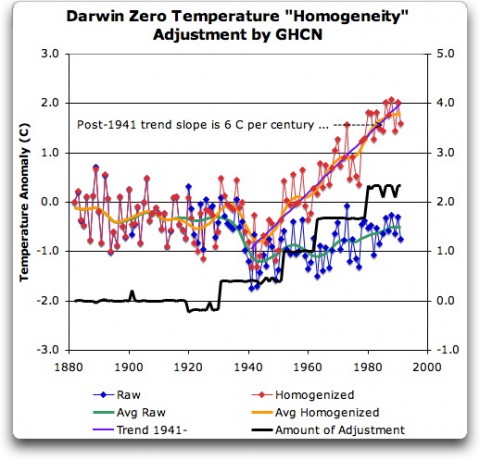It’s a long article, but well worth reading in full:
People keep saying “Yes, the Climategate scientists behaved badly. But that doesn’t mean the data is bad. That doesn’t mean the earth is not warming.”
Let me start with the second objection first. The earth has generally been warming since the Little Ice Age, around 1650. There is general agreement that the earth has warmed since then. See e.g. Akasofu. Climategate doesn’t affect that.
The second question, the integrity of the data, is different. People say “Yes, they destroyed emails, and hid from Freedom of information Acts, and messed with proxies, and fought to keep other scientists’ papers out of the journals . . . but that doesn’t affect the data, the data is still good.” Which sounds reasonable.
There are three main global temperature datasets. One is at the CRU, Climate Research Unit of the University of East Anglia, where we’ve been trying to get access to the raw numbers. One is at NOAA/GHCN, the Global Historical Climate Network. The final one is at NASA/GISS, the Goddard Institute for Space Studies. The three groups take raw data, and they “homogenize” it to remove things like when a station was moved to a warmer location and there’s a 2C jump in the temperature. The three global temperature records are usually called CRU, GISS, and GHCN. Both GISS and CRU, however, get almost all of their raw data from GHCN. All three produce very similar global historical temperature records from the raw data.
[. . .]

Yikes again, double yikes! What on earth justifies that adjustment? How can they do that? We have five different records covering Darwin from 1941 on. They all agree almost exactly. Why adjust them at all? They’ve just added a huge artificial totally imaginary trend to the last half of the raw data! Now it looks like the IPCC diagram in Figure 1, all right … but a six degree per century trend? And in the shape of a regular stepped pyramid climbing to heaven? What’s up with that?
Those, dear friends, are the clumsy fingerprints of someone messing with the data Egyptian style . . . they are indisputable evidence that the “homogenized” data has been changed to fit someone’s preconceptions about whether the earth is warming.
One thing is clear from this. People who say that “Climategate was only about scientists behaving badly, but the data is OK” are wrong. At least one part of the data is bad, too. The Smoking Gun for that statement is at Darwin Zero.
I’m in no way qualified to pass judgement on any of this. My bias is usually to trust that the scientist has no pre-decided outcome in mind . . . and that they verify their data supports the conclusions before publishing. Climategate/Climaquiddick shows that, at least in one field, this is not true.
Normally, this sort of science-by-press-release is quickly exposed (think of the cold fusion and the Korean human cloning announcements, for example), which works to quickly stamp out the inclination among others who might try to game the system. In the case of AGW, they did more groundwork before going to the press . . . but if Darwin Zero is an example of the kind of work they did everywhere, then it’s just a better-hidden case of science-by-press-release.
Except — and this is huge — the implications of the deception were not limited to a few undeserving white-coated “scientists” getting press coverage and grant money. The AGW movement aimed at nothing less than a take-over of the entire economy, putting carbon commissars in charge of everything. Their work would lead to pseudo-scientific based controls over all human activities (because, as the EPA recently decided, all greenhouse gases must be regulated . . . and there’s carbon dioxide produced every time you exhale).




